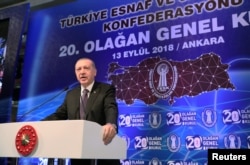Turkish Finance Minister Berat Albayrak heads to Berlin Friday to meet with his German counterpart, Olaf Scholz, as Ankara struggles against an emerging financial crisis. Turkey's currency fell 40 percent this year and discussions on potential financial support from Berlin are expected to be on the agenda.
Albayrak, speaking in Istanbul’s Dolmabahce Palace Thursday, unveiled his much-vaunted medium-term economic plan. He promised to curb debt-fueled growth, enforce financial austerity and undergo a reshaping into the "value-added" economy investors have been clamoring for for years.
The Turkish lira surged before Albayrak’s speech, fueled by rising expectations. However, once delivered, the currency fell sharply with investors criticizing the plan for lack of details, along with concerns over the exposure of Turkish banks to foreign debt.
The Turkish corporate sector is estimated to owe over $100 billion in foreign denominated debt in the next 12 months.
"We are talking of a five or six percent drop in the economy, to pay off debt by contracting imports and expanding exports at any cost,” analyst Atilla Yesilada of Global Source Partners said. “It's going to be extremely painful, really painful. The IMF(International Monetary Fund) can take some of the pain.”
During Turkey's economic crises in the 1990s through to the early 2000s the country depended on bailouts from the IMF. However Turkish President Recep Tayyip Erdogan has repeatedly ruled out IMF support.
“There is a stigma attached to the IMF given that the government has repeatedly said that one of its biggest achievements was to end Turkey’s dependence on the IMF, “ said Sinan Ulgen, head of the Istanbul-based research group Edam. “So for these reasons Erdogan does not want to return to the IMF for support. “
The IMF might be unwilling to provide funds to Turkey given the current animosity between Ankara and Washington, warns international relations expert Soli Ozel of Istanbul.
“The bill that was passed in (the U.S.) Congress to ask American agencies to block multi-international economic institutions, to actually block any kind of loans or favorable terms for Turkey was a very significant and very hostile move,” Ozel said.
The bill Congress passed was in response to the ongoing detention of American pastor Andrew Brunson, who is on trial in Turkey on terrorism charges. Washington claims the allegations are baseless.
Analysts point out while the United States does not have a veto on IMF funding decisions, Washington could delay or complicate any deal with Ankara.
The European Union and in particular Berlin, observers suggest, is seen by Ankara as a politically acceptable source of international financial support. “...That is certainly an idea that is being openly discussed in some of the European capitals, analyst Ulgen said.
“The EU could be an alternative to the IMF, but that is an open-ended question,” he added, “because we don’t have examples of the EU acting unilaterally. Even in past cases related to Greece, for instance, the EU was part of a consortium that also included the IMF.”
Analysts suggest Ankara is likely to be banking on its strategic importance. “Turkey plays an important role in keeping the refugee flow outside the EU. That is a starting point,” former senior Turkish diplomat Aydin Selcen said.
Two years ago Ankara and Belgium signed a migration agreement that resulted in a big reduction in the hundreds of thousands of refugees and migrants a year that once entered the EU.
The continuation of the migrant deal, analyst Ulgen argues, is viewed as a necessity by Berlin. “From the German perspective, there seems to be a fear that the economic instability in Turkey could end up affecting the overall political stability of the country so possible jeopardize Turkey’s ability to stand by its commitments on the refugee deal,” Ulgen said.
However, given any financial assistance to Turkey would likely be in the tens of billions of dollars, there is skepticism about whether Berlin and the rest of the EU would be prepared to act alone.
“Regarding the European funding, the indications are so far they would want an IMF involvement,” chief economist Inan Demir of financial services company Nomura International said.
“Even if there is no IMF involvement in the (financial support) package,” he added, “that funding would come with conditions similar to those that would come from the IMF. I am very skeptical that those conditions would be acceptable to the Turkish government.”
Analysts suggest measures including ending Erdogan’s prestige mega-construction projects would likely be demanded in any financial assistance deal, along with calls for reform to ensure an independent judiciary, a concern of many foreign investors. The Turkish president has until now resisted such reforms.





